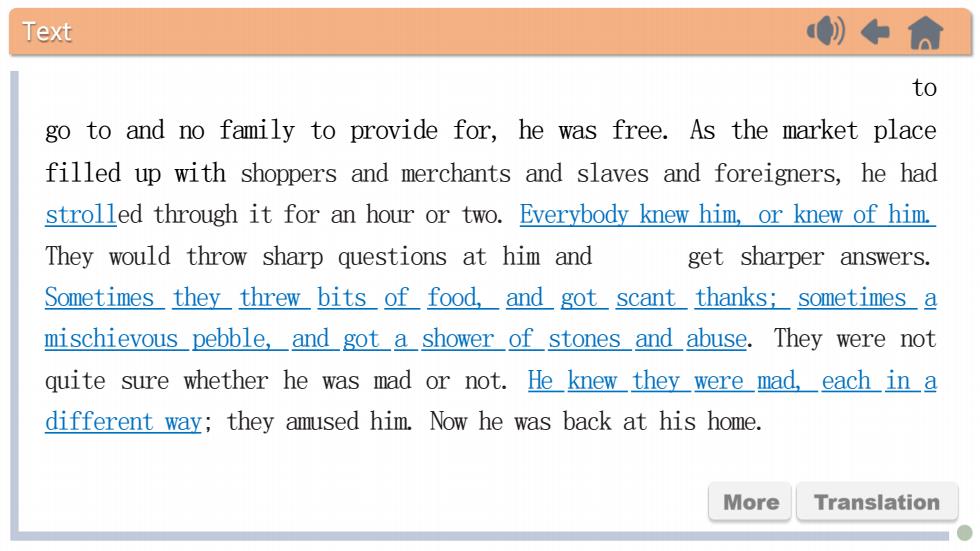
Text食togo to and no family to provide for, he was free. As the market placefilled up with shoppers and merchants and slaves and foreigners, hehadstrolled through it for an hour or two. Everybody knew him, or knew of himThey would throw sharp questions at him andget sharper answers.Sometimes they threw bits of foodand got scant thanks:sometimes amischievous pebble, and got a shower of stones and abuse. They were notquite sure whether he was mad or not. He_knew_ they_were_mad_each inadifferentway;they amusedhim.Nowhewasbackathishome.MoreTranslation
to work no Having go to and no family to provide for, he was free. As the market place filled up with shoppers and merchants and slaves and foreigners, he had strolled through it for an hour or two. Everybody knew him, or knew of him. They would throw sharp questions at him and get sharper answers. Sometimes they threw bits of food, and got scant thanks; sometimes a mischievous pebble, and got a shower of stones and abuse. They were not quite sure whether he was mad or not. He knew they were mad, each in a different way; they amused him. Now he was back at his home. Text
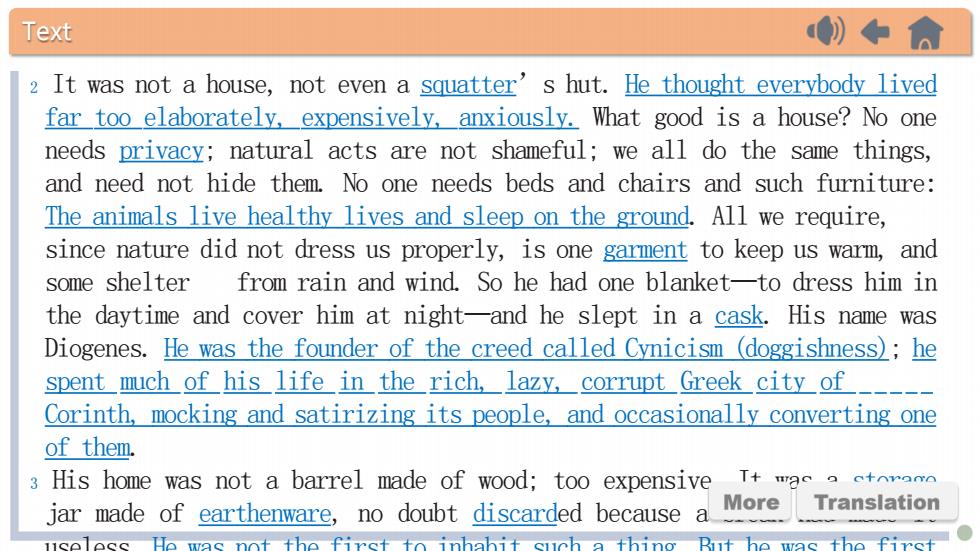
Text+食2 It was not a house, not even a squatter' s hut. He thought everybody livedfar too elaborately,expensively,anxiously.What good is a house? No oneneeds privacy; natural acts are not shameful; we all do the same things,and need not hide them No one needs beds and chairs and such furniture:The animals live healthy lives and sleep on the ground. All we require,since nature did not dress us properly, is one garment to keep us warm, andsome shelterfrom rain and wind So he had one blanket-to dress him inthe daytimeand coverhim atnight-andhesleptinacask.His name wasDiogenes. He was the founder of the creed called Cymicism (doggishness); hespent_much of his life in the rich, lazy, corrupt Greek city ofCorinth, mocking and satirizing its people, and occasionally converting oneof them.T+maS3 His home was not a barrel made of wood; too expensiveMoreTranslationjar made of earthenware, no doubt discarded becauseafirc
2 It was not a house, not even a squatter’s hut. He thought everybody lived far too elaborately, expensively, anxiously. What good is a house? No one needs privacy; natural acts are not shameful; we all do the same things, and need not hide them. No one needs beds and chairs and such furniture: The animals live healthy lives and sleep on the ground. All we require, since nature did not dress us properly, is one garment to keep us warm, and some shelter from rain and wind. So he had one blanket—to dress him in the daytime and cover him at night—and he slept in a cask. His name was Diogenes. He was the founder of the creed called Cynicism (doggishness); he spent much of his life in the rich, lazy, corrupt Greek city of Corinth, mocking and satirizing its people, and occasionally converting one of them. 3 His home was not a barrel made of wood; too expensive. It was a storage jar made of earthenware, no doubt discarded because a break had made it useless. He was not the first to inhabit such a thing. But he was the first who ever did so by choice, out of principle. Text
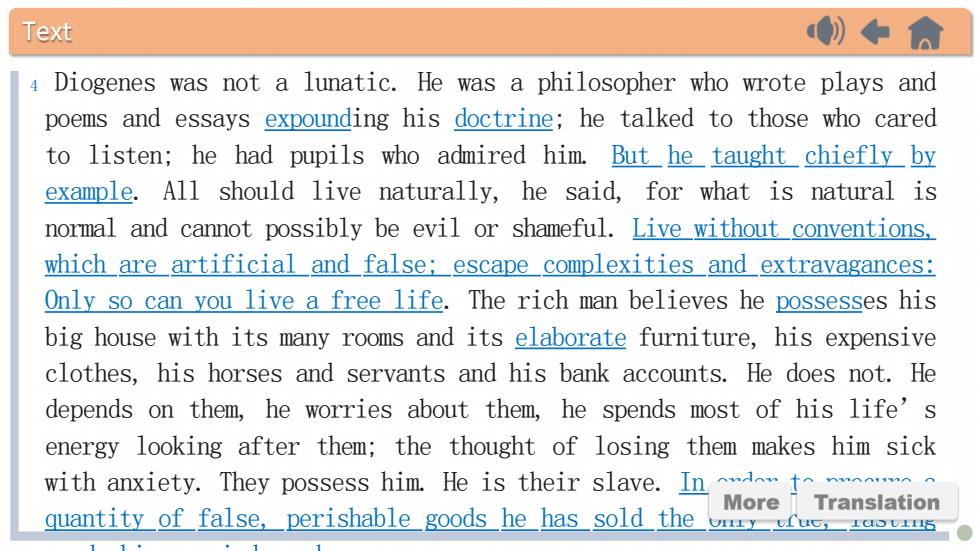
Text会4 Diogenes was not a lunatic.He was a philosopher who wrote plays andpoems and essays expounding his doctrine; he talked to those who caredto listen;he hadpupilswho admiredhim.Buthetaughtchieflybyexample.All should live naturally,he said,for what is natural isnormal and cannot possibly be evil or shameful. Live without conventions,which are _artificial _and false:_escape_complexities_and_extravagances:Only so can you live a free life.The richman believes he possesses hisbig house with its many rooms and its elaborate furniture, his expensiveclothes, his horses and servants and his bank accounts.He does not.Hedepends on them, he worries about them, he spends most of his life' senergylooking afterthem;thethoughtoflosingthem makeshim sickwith anxiety. They possess him. Heis their slave.In od,MoreTranslationquantity of false,perishable goods he has sold theDUH
4 Diogenes was not a lunatic. He was a philosopher who wrote plays and poems and essays expounding his doctrine; he talked to those who cared to listen; he had pupils who admired him. But he taught chiefly by example. All should live naturally, he said, for what is natural is normal and cannot possibly be evil or shameful. Live without conventions, which are artificial and false; escape complexities and extravagances: Only so can you live a free life. The rich man believes he possesses his big house with its many rooms and its elaborate furniture, his expensive clothes, his horses and servants and his bank accounts. He does not. He depends on them, he worries about them, he spends most of his life’s energy looking after them; the thought of losing them makes him sick with anxiety. They possess him. He is their slave. In order to procure a quantity of false, perishable goods he has sold the only true, lasting good, his own independence. Text
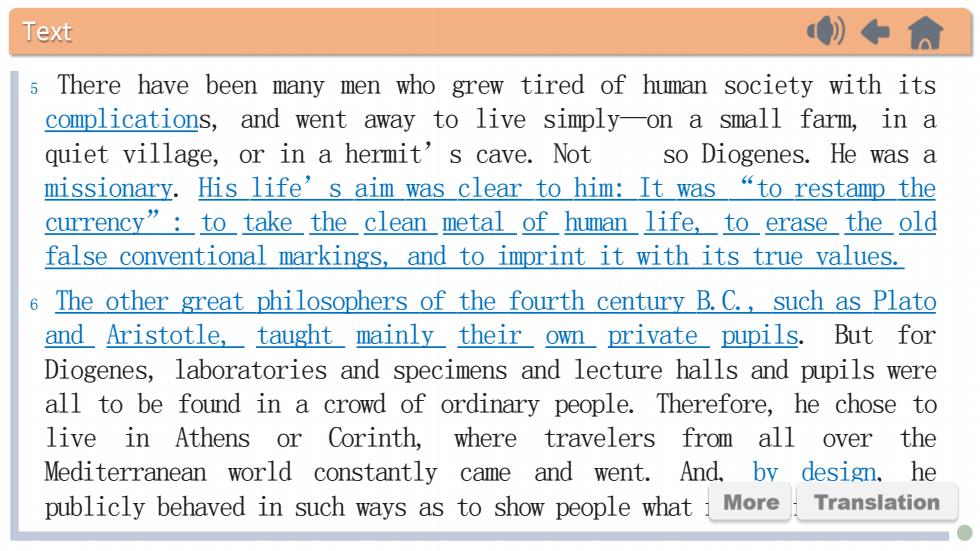
Text+食5Therehave been many men whogrew tired of human society with itscomplications,and went away to live simplyon a small farm,in aquiet village, or in a hermit' s cave. Notso Diogenes.He was amissionary. His life' s aim was clear to him: It was “to restamp thecurrency” : to take the clean metal of human life, to erase the oldfalse conventional markings, and to imprint it with its true values.6 The other great philosophers of the fourth century B. C., such as Platoand Aristotle,taught mainlytheirown privatepupils.ButforDiogenes, laboratories and specimens and lecture halls and pupils wereall to be found in a crowd of ordinary people.Therefore,he chose toliveinAthensorCorinth,wheretravelersfromallovertheMediterranean world constantly came and went.And.bydesign.hepublicly behaved in such ways as to show people what MoreTranslation
5 There have been many men who grew tired of human society with its complications, and went away to live simply—on a small farm, in a quiet village, or in a hermit’s cave. Not so Diogenes. He was a missionary. His life’s aim was clear to him: It was “to restamp the currency”: to take the clean metal of human life, to erase the old false conventional markings, and to imprint it with its true values. 6 The other great philosophers of the fourth century B.C., such as Plato and Aristotle, taught mainly their own private pupils. But for Diogenes, laboratories and specimens and lecture halls and pupils were all to be found in a crowd of ordinary people. Therefore, he chose to live in Athens or Corinth, where travelers from all over the Mediterranean world constantly came and went. And, by design, he publicly behaved in such ways as to show people what real life was. Text
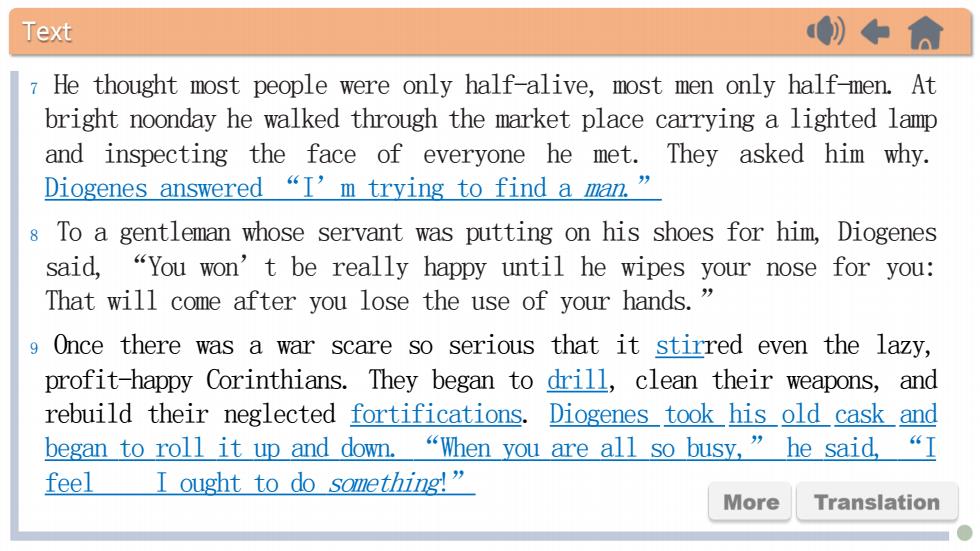
Text+食7 He thought most people were only half-alive, most men only half-men. Atbright noonday he walked through the market place carrying a lighted lampand inspecting the face of everyone he met.They asked him why.Diogenes answered “I' m trying to find a man. " To a gentleman whose servant was putting on his shoes for him, Diogenessaid,“You won' t be really happy until he wipes your nose for you:That will come after you lose the use of your hands. "g Once there was a war scare so serious that it stirred even the lazy,profit-happy Corinthians. They began to drill, clean their weapons, andrebuild their neglected fortifications. Diogenes took his old cask andbegan to roll it up and down.“when you are all so busy,” he said, “IfeelI ought to do something!"MoreTranslation
7 He thought most people were only half-alive, most men only half-men. At bright noonday he walked through the market place carrying a lighted lamp and inspecting the face of everyone he met. They asked him why. Diogenes answered “I’m trying to find a man.” 8 To a gentleman whose servant was putting on his shoes for him, Diogenes said, “You won’t be really happy until he wipes your nose for you: That will come after you lose the use of your hands.” 9 Once there was a war scare so serious that it stirred even the lazy, profit-happy Corinthians. They began to drill, clean their weapons, and rebuild their neglected fortifications. Diogenes took his old cask and began to roll it up and down. “When you are all so busy,” he said, “I feel I ought to do something!” Text